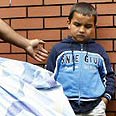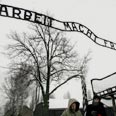

Gypsies attending an international conference on the Holocaust said Monday the suffering they endured at the hands of Nazis during World War II has never been fully recognized.
"We are still fighting for the recognition of the genocide of the Roma population during the war," said Cenek Ruzicka, a prominent Gypsy leader. The nomadic Caucasoid people found throughout the world also are known as Roma.
"The Romani Holocaust still has to be studied," said Ruzicka, who wants the Czech government to create a fund that would finance research of Roma suffering and properly compensate the few survivors still alive today.
Jan Istvan is one of them.
In December of 1942, he escaped from a place where the Nazis herded Czech Gypsies before transporting them to death camps. He was lucky and made it out alive. His parents and six siblings died.
"Nobody survived," the 88-year-old told The Associated Press in a recent interview.
Up to half a million European Gypsies, also known as Roma, are believed to have died at the hands of the Nazis during the Second World War – along with 6 million Jews. Others were sterilized or subjected to grisly experiments.
It is a little-explored and tragic part of history that many experts and survivors say deserves more attention.
"Roma were subject to the same Holocaust as Jews," said Felix Kolmer, a vice president of the International Auschwitz Committee and one of the organizers of the conference who invited Ruzicka to talk at the five-day gathering.
Ruzicka used the meeting to address a thorny issue – a communist-era pig farm and vacation resort on the grounds of two former camps where hundreds of Czech Roma died.
One of these camps was in Lety, 60 miles (95 kilometers) south of Prague, where some 1,300 Czech Roma were sent between August 1942 and August 1943. While 327 people died there, many others were taken to the Auschwitz concentration camp in Poland.
The second camp, known as Hodonin u Kunstatu, was located in the eastern part of what was then Czechoslovakia. Of the 1,360 Roma detained there, 207 died.
"Nobody can challenge the facts," Ruzicka said. "You don't build pig farms or enjoy your vacation at places like that."
'Time when people ceased being humans'
The Czech Human Rights Ministry has been planning to build a center for studying Roma culture in Hodonin, but there are no plans to remove the pig farm. Instead, the government has offered to upgrade a nearby memorial in honor of the victims.
To Istvan, still haunted by his ordeal, the reticence to officially recognize what he and his family went through is a slap in the face.
"I wonder from time to time how is it possible that it was me who survived?" he said. "That starvation, that poverty, that beating – that time when people ceased being humans."
The Nazis, together with Czech police, deported him and his family to Hodonin u Kunstatu in June 1942.
"Conditions in the camp were harsh," Istvan said, adding that family members were separated from each other and that many people died of starvation and infectious diseases.
Only about 10% of some 6,500 Gypsies living on occupied Czechoslovak territory are estimated to have survived. Of the roughly 5,000 who were transported to Auschwitz and other camps, 583 returned home.
To this day, Europe's 7 to 9 million Roma still face widespread prejudice.















